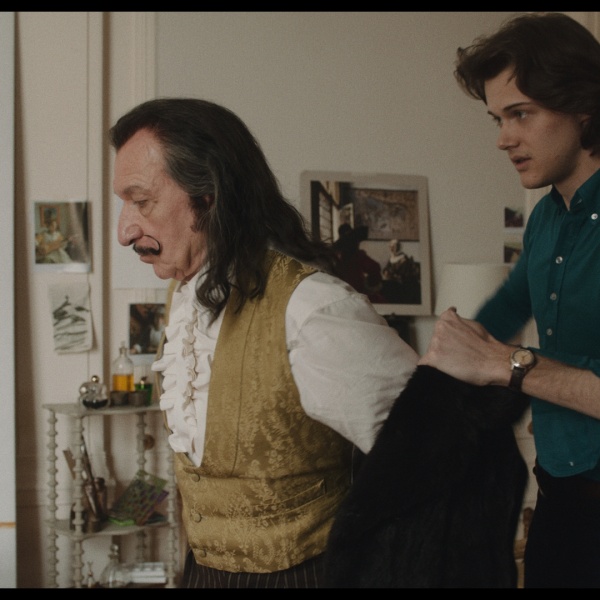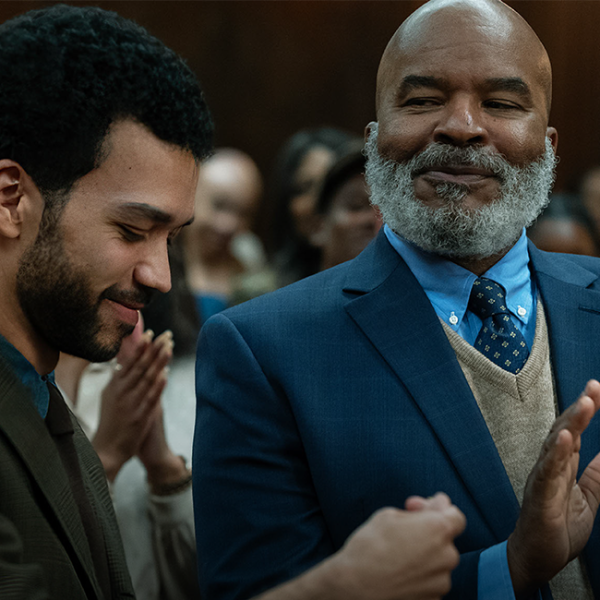Editor’s note: This review was originally published at the 2022 Venice Film Festival. IFC Films releases the film in theaters on Friday, May 12.
Mirrors are more than just refracted light — they are how we see ourselves and a reflection of how others see us. Reflections are everywhere in “Monica,” an understated family drama starring Trace Lysette as a woman who reluctantly returns home to see her estranged and ailing mother. Shot in an elegant 1:1 aspect ratio, we see Monica through French doors left ajar, in the glass frames of childhood photos, and the patina of the antique mirror in her mother’s girlish bedroom. If there is a reflection to be found, Monica is there.
Caustic and frail, Eugenia (Patricia Clarkson) doesn’t recognize her daughter, though it’s unclear whether that’s the dementia or because Monica is trans. Spare but poignant, “Monica” is a pensive family drama that’s loaded with the empty space of things left unsaid.
The film opens with New Order’s “Bizarre Love,” on an extreme close-up of Monica in metallic tanning goggles. Outside in her red convertible, we see her in profile from slightly behind, making belabored phone calls through the glass of her half-rolled window. She’s begging someone named Jimmy to return her calls; he’s asked her not to call but she just needs to hear his voice. “Hot girl, hot car,” offers a creep from out of frame before Monica nearly runs him over. Male attention is not in short supply for Monica, except from the one she wants.
The particulars of the premise unfold sparingly as Monica is greeted by her sister-in-law Laura (Emily Browning) and three kids, whom she’s meeting for the first time. Laura brings her to the house, a stately Colonial that has fallen into disrepair, where she is introduced to her mother simply as Monica. “She’s here to help” is all that Eugenia, and the audience, are told. In a brief discussion afterwards, Laura apologizes for not explaining further, but thought she’d leave such a personal conversation up to Monica.
Alone in her room that night, Monica poses in lingerie for her webcam clients, though she’s soon interrupted by Eugenia’s pained shrieks. Unsure of herself at first, Monica stands paralyzed at the door before gently cradling her mother’s greying head as she cries out for her own mother. Unsurprisingly, Clarkson’s performance is both wrenching and understated, rendering the moment simple and penetrating. The scene is an aching portrait of a parent becoming the child, which takes on added layers of poignance as Monica’s complicated feelings towards her mother begin to emerge. Though they take their time doing so.
The film takes a very restrained approach to the contours of the story, doling out information only at the very last minute. Unfurling at a slow simmer, Monica remains a mystery for most of the film, for better or worse. This is measured storytelling that demands patience, but the rewards are subtle, too. When she’s not being seen in a mirror, Monica is always shot from the side or behind, sometimes we see only her windswept hair or headless body. She’s opaque to herself, unsure of her feelings about being back in her childhood home, but also to the viewer. A scene where she finally speaks to her brother Paul (Joshua Close) reveals the limits of the script, as a childhood anecdote about a mismatched shoe offers little in the way of character development.
Directed by Italian filmmaker Andrea Pallaoro from a script he wrote with Orlando Tirado, “Monica” is a meticulously crafted master class in restraint. Without much to go on, everything from a plaintive music box tune to a coyote in a driveway takes on dramatic heft. This minimalist aesthetic leaves plenty of room for the heavier moments, like Eugenia’s breakdown or Monica’s inevitable outburst. Sadness and anger bubble to the surface in fits and starts, punctuating the otherwise placid waters of golden light and well-placed mirrors.
Katelin Arizmendi’s luminous cinematography speaks volumes where the script leaves silence. The dream-like cut to a game of freeze tag opens mysteriously, with Monica suspended in mid-air as her nephew runs up behind her in the lush green woods. She’s stuck in time, stalled by her childhood rejection, only to be unfrozen by the family she never really knew. Or the inspired shot of Eugenia, smiling in a round compact, overlaid onto Monica’s face while she does her mother’s make-up. There are no stories of Monica playing with mother’s make-up, but they hang in the air in such tender visual cues.
Of course, Lysette is the canvas, brush, and paint that makes “Monica” shine. Stunning to watch and radiating great depth, she carries the film with a graceful dignity. Her comedic timing made her a standout in “Transparent” and “Hustlers,” and it’s refreshing and inspiring to see her take on a dramatic role with such confidence and ease. What’s more, “Monica” achieves a delicate balance that’s wholly unlike other trans films, delivering a universal human story that neither ignores nor obsesses over the character’s trans-ness. “Monica” raises the bar for trans stories onscreen, and Lysette takes her rightful place as its muse.
Grade: B+
“Monica” premiered at the 2022 Venice Film Festival.





